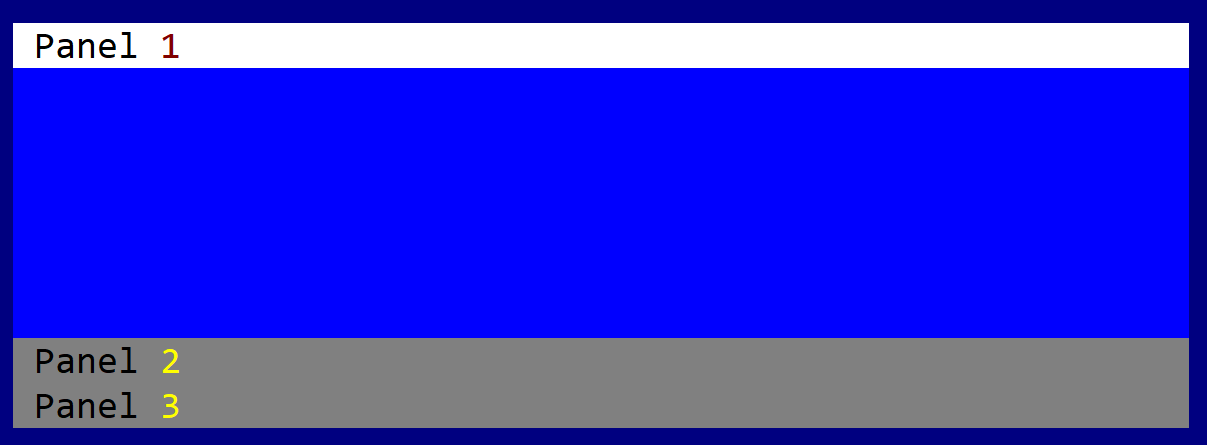Accordion
An accordion control is a graphical user interface element that consists of a vertically stacked list of panels. Only one panel can be "expanded" to reveal its associated content.

To create an accordion use Accordion::new methods:
let a1 = Accordion::new(layout!("a:c,w:15,h:10"),accordion::Flags::None);
or the macro accordion!
let a2 = accordion!("a:c,w:15,h:10,panels:[First,Second,Third]");
let a3 = accordion!("a:c,w:15,h:10,panels:[A,B,C],flags:TransparentBackground");
The caption of each accordion may contain the special character & that indicates that the next character is a hot-key. For example, constructing a accordion panel with the following caption &Start will set up the text of the accordion to Start and will set up character S as the hot key to activate that accordion panel.
A accordion supports all common parameters (as they are described in Instantiate via Macros section). Besides them, the following named parameters are also accepted:
| Parameter name | Type | Positional parameter | Purpose |
|---|---|---|---|
flags | List | No | Accordion initialization flags (available list include: TransparentBackground) |
panels | List | No | A list of accordion panels |
A accordion supports the following initialization flags:
accordion::Flags::TransparentBackgroundorTransparentBackground(for macro initialization) - this will not draw the background of the accordion
Some examples that uses these paramateres:
let t1 = accordion!("panels:[Tab1,Tab2,Accordion&3],d:f");
let t2 = accordion!("panels:[A,B,C],flags:TransparentBackground,d:f");
Events
To intercept events from an accordion, the following trait has to be implemented to the Window that processes the event loop:
pub trait AccordionEvents {
fn on_panel_changed(&mut self, handle: Handle<Accordion>,
new_panel_index: u32,
old_panel_index: u32) -> EventProcessStatus
{
// This method is called when the current panel of the accordion is changed.
// The `handle` parameter is the handle of the accordion control.
EventProcessStatus::Ignored
}
}
Methods
Besides the Common methods for all Controls a accordion also has the following aditional methods:
| Method | Purpose |
|---|---|
add_panel(...) | Adds a new accordion panel |
add(...) | Add a new control into the accordion (the index of the accordion where the control has to be added must be provided) |
current_panel() | Provides the index of the current accordion panel |
set_current_panel(...) | Sets the current accordion panel (this method will also change the focus to the accordion cotrol) |
panel_caption(...) | Returns the caption (name) or a accordion panel based on its index |
set_panel_caption(...) | Sets the caption (name) of a accordion panel |
Key association
The following keys are processed by a Accordion control if it has focus:
| Key | Purpose |
|---|---|
Ctrl+Tab | Select the next accordion. If the current accordion is the last one, the first one will be selected. |
Ctrl+Shift+Tab | Select the previous accordion. If the current accordion is the first one, the last one will be selected |
Aditionally, Alt+letter or number will automatically select the accordion with that particular hotkey combination.
Example
The following code creates an accordion with 3 panels and adds two buttons on each accordion panel.
use appcui::prelude::*;
fn main() -> Result<(), appcui::system::Error> {
let mut app = App::new().build()?;
let mut w = window!("Test,d:f");
let mut t = accordion!("l:1,t:1,r:1,b:3,panels:['Panel &1','Panel &2','Panel &3']");
t.add(0, button!("T1-1-A,r:1,b:0,w:10,type:flat"));
t.add(0, button!("T1-1-B,a:c,w:10,type:flat"));
t.add(1, button!("T1-2-A,r:1,b:0,w:14,type:flat"));
t.add(1, button!("T1-2-B,a:c,w:14,type:flat"));
t.add(2, button!("T1-3-A,r:1,b:0,w:20,type:flat"));
t.add(2, button!("T1-3-B,d:l,w:20,type:flat"));
w.add(t);
w.add(button!("OK,r:0,b:0,w:10, type: flat"));
w.add(button!("Cancel,r:12,b:0,w:10, type: flat"));
a.add_window(w);
a.run();
Ok(())
}